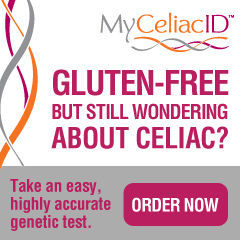 |
| Continuing Education |
Learn about PEG tube feeding at the end of life in this month’s issue of Today’s Dietitian. Read the “Today’s CPE” article, take the 10-question online test, and earn two CPEUs!
Click here for details.
|
|
 |
 |
| Advertising Opportunities |
Have a product or service you want to market to dietitians and nutritional professionls or an open position that you need to fill quickly? Today’s Dietitian offers many flexible
advertising programs designed to maximize your results. From print
advertising to E-newsletter sponsorships, Web site advertising to
direct mail opportunities, Today’s Dietitian helps
achieve your goals.
E-mail our experienced account
executives today for more information or call 800-278-4400!
AlliedHealthCareers.com is the premier online resource to recruit nutrition professionals.
Post your open positions, view resumes and showcase your facility's
offerings all at AlliedHealthCareers.com!
To unsubscribe from this mailing list,
simply send a message to TD_Newsletter@gvpub.com with "Unsubscribe" in the subject line.
To change your e-mail address, please visit our Web site to unsubscribe
your old address and sign up with your new one.

|
|
 |
 |
| Other Nutrition News |
Observational Studies Link Obesity and Cancer
A 2007 World Cancer Research Fund and American Institute for Cancer Research report calls the data “convincing,” according to an article in the Los Angeles Times.
Vitamin D Is Lacking in Babies
A study in Pediatrics points to the importance of supplementation in infants, reports a Health.com article posted on the CNN Web site.
|
|
 |
 |
| Gift Shop |
| Whether you’re searching for yourself or for gifts to give professional colleagues, show your professional pride with quality nutrition-themed items like shirts, coffee mugs, tote bags, mouse pads and more. It's easy and affordable on the Today's Dietitian online Gift Shop. Check out our secure online shop today or call toll-free 877-809-1659 for easy and fast ordering. |
|
 |
 |
 |
| Editor's E-Note |

Winter’s icy hand touched many parts of the country more dramatically than ever this year and covered some cities in record snowfalls. If you live on the East Coast, the arrival of spring may seem even sweeter than usual. Like me, you’re probably looking forward to the beauty and bounty that warmer weather brings. I can’t wait to head down to my friendly neighborhood orchard to sample the first fresh offerings and later to pick strawberries and blueberries—the makings of succulent snacking.
As nutrition professionals, you’re no doubt well aware of berries’ benefits, but are you up on the research investigating the fruits’ disease-preventing properties? Take a look at the evidence in this edition’s E-News Exclusive, which summarizes the research on the polyphenols from berries.
 Our April print issue offers antioxidant content aplenty, including the baby boomer generation’s interest in supplemental and dietary forms of antioxidants and the use of antioxidants during cancer therapy. Our April print issue offers antioxidant content aplenty, including the baby boomer generation’s interest in supplemental and dietary forms of antioxidants and the use of antioxidants during cancer therapy.
Enjoy the season, and be sure to visit Today’s Dietitian on Facebook!
— Heather W. Gurk, editor |
|
 |
 |
| E-News Exclusive |

With Polyphenols Aplenty, Berries May Protect From Disease
By Maria Frye
Revered for their dessertlike qualities, edible berries have been part of the human diet for centuries. Romans grew the ancestor of strawberries, which later crossed with varieties in America and Chile around 1750. Europeans have cultivated raspberries since the Middle Ages, and man might have consumed blackberries since the Neolithic Era.
While we have satisfied our palates with these delicious fruits for hundreds of years, researchers have recently started recognizing berries’ health properties, including their phytochemical content. Common berry fruits such as black and red raspberries, blackberries, blueberries, and strawberries are rich sources of phytochemicals, especially the polyphenols or phenolic compounds. Berries are particularly plentiful sources of polyphenols, including flavonoids such as anthocyanins and flavonols, as well as ellagitannins.
Researchers have studied these polyphenols from berries in vitro and in rats and humans. Although epidemiological research has not consistently demonstrated the benefits of these phytochemicals from berries, research in vitro and on rodents have been favorable in revealing how these fruits may provide protection from disease.
Full Story » |
|
 |
 |
| Field Notes |
Kidney Disease Hides in People With Undiagnosed Diabetes
 Millions of Americans may have chronic kidney disease (CKD) and not know it, according to a study appearing in the Clinical Journal of the American Society of Nephrology. Millions of Americans may have chronic kidney disease (CKD) and not know it, according to a study appearing in the Clinical Journal of the American Society of Nephrology.
“Our research indicates that much of the CKD burden in the United States is in persons with prediabetes and undiagnosed diabetes who are not being screened for CKD,” says Laura C. Plantinga, ScM, of the University of California, San Francisco. The researchers believe broader screening may be needed to detect patients with these two “relatively silent yet harmful diseases.”
Read More » |
|
 |
 |
| Print Preview |

In the May issue
The environmental impact of eating meat
Fiber-boosting foods and recipes
Improving health literacy in low-literate populations
Breast-feeding in the workplace |
|
 |
 |
| Ask the Expert |
Have a dietetics-related question that you would like an expert to answer? E-mail TDeditor@gvpub.com and we may feature your query!
|
|
 |
|


